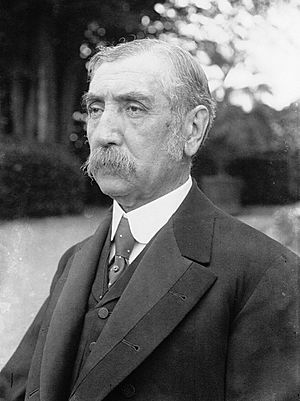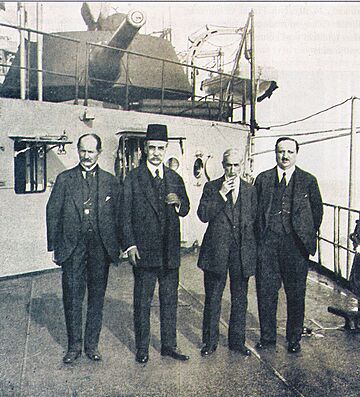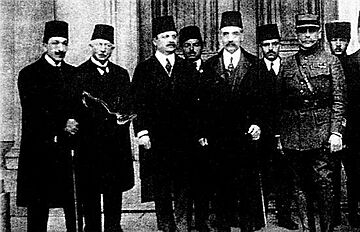Damat Ferid Pasha facts for kids
Quick facts for kids
Damat
Mehmed Adil Ferid
Pasha
|
|
|---|---|
 |
|
| Grand Vizier of the Ottoman Empire | |
| In office 4 March 1919 – 2 October 1919 |
|
| Monarch | Mehmed VI |
| Preceded by | Ahmet Tevfik Pasha |
| Succeeded by | Ali Rıza Pasha |
| In office 5 April 1920 – 21 October 1920 |
|
| Monarch | Mehmed VI |
| Preceded by | Salih Hulusi Pasha |
| Succeeded by | Ahmet Tevfik Pasha |
| Personal details | |
| Born | 1853 Istanbul, Ottoman Empire |
| Died | 6 October 1923 (aged 69–70) Nice, France |
| Nationality | Ottoman |
| Political party | Freedom and Accord Party |
| Spouse | Mediha Sultan |
Damat Mehmed Adil Ferid Pasha (Ottoman Turkish: محمد عادل فريد پاشا Turkish: Damat Ferit Paşa; 1853 – 6 October 1923) was an important Ottoman statesman. He served as the Grand Vizier, which was like the prime minister, two times. This was during the rule of the last Ottoman Sultan, Mehmed VI. His first time as Grand Vizier was from March 1919 to October 1919. His second time was from April 1920 to October 1920.
He was a key figure during a very difficult time for the Ottoman Empire. This was right after World War I. Because of his role in the Treaty of Sèvres and working with the countries that occupied Ottoman lands, many people in Turkey saw him as a traitor. He had to leave Turkey and moved to Europe.
Life and Early Career
Mehmed Adil Ferid was born in 1853 in Istanbul, the capital of the Ottoman Empire. His father, Izet Efendi, was also involved in government.
In 1879, Ferid started working in the Ottoman government. He held several jobs before joining the foreign office. This meant he worked on matters with other countries. He served at Ottoman embassies in big cities like Paris, Berlin, St. Petersburg, and London.
He became known as "damat" because he married Mediha Sultan. She was a daughter of Abdülmecid I, an earlier Ottoman Sultan. The title "damat" means "bridegroom" to the royal family. In 1884, he became a member of the Council of State, a high-level government group. Soon after, he also earned the title of vizier.
Ferid Pasha later became one of the people who started the Freedom and Accord Party in 1911. This party believed in more freedom and local control within the Empire. It was different from another powerful group called the Committee of Union and Progress.
In 1919, after World War I, he officially acknowledged that serious events had happened against Armenians. He also played a role in the Istanbul trials. These trials aimed to bring to justice those responsible for these difficult events.
As Grand Vizier
Ferid Pasha's first time as Grand Vizier began on March 4, 1919. This was a very chaotic time. The Greek army had just occupied the city of Smyrna (now Izmir). He hoped that by cooperating with the Allied powers (the countries that won WWI), the Ottoman Empire would get a less harsh peace treaty. He was known to trust England a lot.
He was dismissed from his role in September 1919. However, after two other short-lived governments, Sultan Mehmed VI asked him to form a new government. So, he became Grand Vizier again on April 5, 1920. He stayed in this position until October 1920.
During his second time as Grand Vizier, the Ottoman Parliament was closed. This happened because of pressure from the British and French forces who were occupying parts of the country.
Ferid Pasha was one of the people who agreed to sign the Treaty of Sèvres. This treaty was a peace agreement after World War I. It contained very harsh conditions for Turkey. This caused a lot of anger and strong reactions against him.

Because of his actions, especially signing the Treaty of Sèvres, the new Turkish government declared him a "persona non grata". This meant he was not welcome in Turkey. He also lost his citizenship. Ferid Pasha then became more and more against the new Turkish National Movement. This movement was led by Mustafa Kemal Pasha and was based in Ankara. Damat Ferid Pasha started to work more closely with the Allied occupation forces.
After the Turkish forces won the Greco-Turkish War (1919–1922), Damat Ferid Pasha was still very unpopular. He fled to Europe. He died in Nice, France, on October 6, 1923. This was the same day that Turkish troops took back Istanbul (Constantinople). He was buried in the city of Sidon, Lebanon.
See also
- List of Ottoman grand viziers
- Chronology of the Turkish War of Independence
Images for kids
 | Kyle Baker |
 | Joseph Yoakum |
 | Laura Wheeler Waring |
 | Henry Ossawa Tanner |



